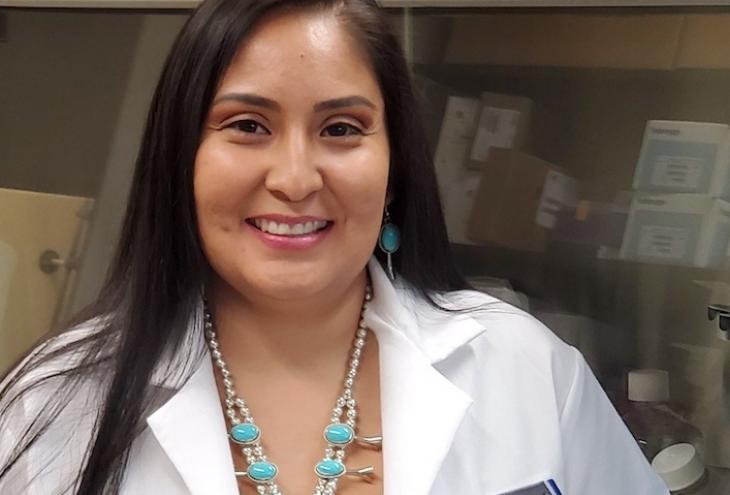These days the lab where Kristina Gonzales-Wartz works is a very busy place. A biomedical scientist with the National Institute of Allergy and Infectious Diseases (NIAID) at the National Institutes of Health (NIH), Dr. Gonzales-Wartz has joined the Laboratory of Immunogenetics in Rockville, Md., on an urgent mission to develop monoclonal antibodies against COVID-19.
That’s an immense challenge, but Dr. Gonzales-Wartz is equipped for the fight. As a PhD candidate at New Mexico State University (NMSU), she gained expertise in developing artificial blood meal. “Blood meal replacements for mosquitos are critical for public health research, where large mosquito populations must be maintained to study diseases like malaria and dengue fever,” she explains. Before graduating with a doctorate in biology in 2018, Dr. Gonzales-Wartz and her team at NMSU broke new ground by developing SkitoSnack, an artificial blood meal replacement.
While her work as a postdoctoral research fellow at NIH started in 2019, Dr. Gonzales-Wartz began impressing the scientists there years ago. In 2012 she was awarded an NIH Bridge to Baccalaureate fellowship, and in 2014 she was named an NIH RISE (Research Initiative for Scientific Enhancement) scholar. Dr. Gonzales-Wartz also earned a Navajo Nation Scholarship and an AISES Lighting the Pathway to Faculty Careers fellowship.
You might think this accomplished STEM star followed a straight, upward path — but that’s not the case. “I always gravitated toward STEM subjects and would enter every science fair. But we didn’t have many science classes at my school,” she says, recalling her years at Red Mesa High School on the Navajo Reservation. “The only science class was biology, and I was in advanced placement. There weren’t courses like chemistry because my school didn’t have the money.”
Resources were scarce where Dr. Gonzales-Wartz grew up in rural Sweetwater, Ariz., about 20 miles off the main highway. In the home that she shared with her mother, stepfather, and three younger brothers, there was no electricity during her elementary-school years. “I would do my homework next to a propane lantern,” she says. “We didn’t have running water until I was in high school.”
Dr. Gonzales-Wartz rose above the odds through a combination of discipline, determination, and encouragement from her family. She excelled in academics, graduating as class salutatorian. She was also a starter on Red Mesa’s volleyball, basketball, and softball teams, and a National Association of Intercollegiate Athletics (NAIA) All-American Scholar-Athlete. And she wants you to know that her mother’s name is Laverne Gonzales and her grandmother is Amelia Watchman, both of Sweetwater. “They taught me to mention them,” she says, “because it’s respectful to tell people where you come from.”
When Dr. Gonzales-Wartz enrolled at Haskell Indian Nations University (HINU) in Kansas, she was excited to take more science courses. But she was relegated to mostly remedial classes because of the gaps in her secondary education. She turned her focus to American Indian studies, which became her major. “I knew when I graduated from college that I really wanted to contribute to my community, but soon I realized that doing so would require more than a degree in American Indian studies.”
So Dr. Gonzales-Wartz took additional college-level classes in subjects like human anatomy and chemistry. She got a job as a research assistant at the NMSU Laboratory of Molecular Vector Physiology in 2012, and a year later began her PhD studies. Her success as a graduate researcher led to her prestigious postgraduate research position at NIH.
Along the way, Dr. Gonzales-Wartz married her husband, Arsino, who’s also Navajo from rural Arizona. While moving to the East Coast last year was a big change for them and sons four-year-old Keanu and two-year-old Ari, they have settled in — in time for a new baby due in April.
After working for more than a year at the Laboratory of Malaria and Vector Research, Dr. Gonzales-Wartz was recruited last spring for a laboratory technician managerial position in the Laboratory of Immunogenetics, part of the Antibody Biology Unit at NIH’s NIAID. “They were interested in my experience isolating malaria sporozoites, the disease agents that enter the bloodstream when a mosquito bites you,” she explains. The lab recognized her potential to help identify potent monoclonal antibodies against COVID-19.
As she and her team battle a global pandemic, Dr. Gonzales-Wartz carries her Native community in her heart. “I know there are still students living in the conditions I did, going to school without good computers or reliable internet, and insufficient science resources,” she observes. “I want to go back home and make a difference, and I’ll find a way to do that. For now, I have to focus on a crisis that’s hitting not only Indian Country hard, but the entire world.”













